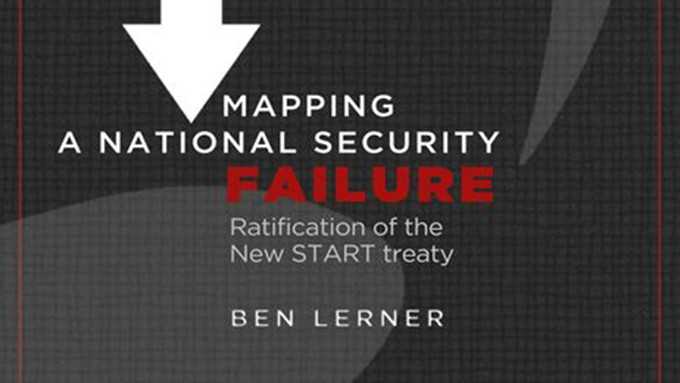Mapping a National Security Failure: Ratification of the New START Treaty

Subsequent Russian and American statements on New START’s effects on missile defense would illustrate a considerable gap. The Russians released the following statement commenting on the Preamble, in which they highlighted future development of U.S. missile defense as grounds for withdrawing from the treaty:
The Treaty between the Russian Federation and the United States of America on the Reduction and Limitation of Strategic Offensive Arms signed in Prague on April 8, 2010, can operate and be viable only if the United States of America refrains from developing its missile defense capabilities quantitatively or qualitatively.
Consequently, the exceptional circumstances referred to in Article 14 of the Treaty include increasing the capabilities of the United States of America’s missile defense system in such a way that threatens the potential of the strategic nuclear forces of the Russian Federation.[98]
The United States would respond with the following statement:
The United States of America takes note of the Statement on Missile Defense by the Russian Federation. The United States missile defense systems are not intended to affect the strategic balance with Russia. The United States missile defense systems would be employed to defend the United States against limited missile launches, and to defend its deployed forces, allies and partners against regional threats. The United States intends to continue improving and deploying its missile defense systems in order to defend itself against limited attack and as part of our collaborative approach to strengthening stability in key regions.[99]
Russian and U.S. officials continued to insist that their respective interpretation was the correct one. Secretary of State Clinton, one day after New START’s signature, stated:
Now, one aspect of our deterrent that we specifically did not limit in this treaty is missile defense. The agreement has no restrictions on our ability to develop and deploy our planned missile defense systems or long-range conventional strike weapons now or in the future.[100]
Contrast with an earlier statement by Russian Foreign Minister Sergei Lavrov: “Linkage to missile defense is clearly spelled out in the accord and is legally binding.”[101]
Following such diverging statements from the United States and Russia on the treaty’s relationship to missile defense, skeptics began to raise the question of what could be informing Russia’s stated understanding that U.S. missile defense development was restricted by the provisions of New START. The question led some to posit that there was an understanding reached on missile defense that went beyond the American and Russian public statements on the matter—one that led the Russians to believe that New START had in fact given them an effective veto over U.S. missile defense. As veteran Russia analyst Dimitri Simes reported:
According to Leonid Ivashov, a retired three-star general and well-known hard-liner, the treaty was a ‘real diplomatic success,’ because the Russian delegation ‘did not yield.’ Another well-known hardliner, Sergey Kurginyan, stated bluntly that ‘Russia could not have an easier partner on the topic of nuclear arms than Obama.”
Russian experts and officials have this view because they believe that America made a tacit commitment not to develop an extended strategic missile defense. As a senior Russian official said to me, ‘I can’t quote you unequivocal language from President Obama or Secretary Clinton in conversations with us that there would be no strategic missile defenses in Europe, but everything that was said to us amounts to this.’ In this official’s account, the full spectrum of U.S. officials from the President to working-level negotiators clearly conveyed that the reason they rejected more explicit restrictions on missile defense was not because of U.S. plans, but because of fear that such a deal could not win Senate ratification.[102] (Emphasis added)
The ambiguity surrounding what exactly the Russians understood themselves to be obtaining on missile defense restrictions by ratifying New START would prompt several members of the Senate Foreign Relations Committee to request on 6 May 2010 that the Obama administration provide the full New START negotiating record, which would be followed by repeated requests.[103]
The administration denied all such requests, eventually agreeing to provide only a summary.[104] The initial response from Secretary Clinton was that there was no precedent for the provision of treaty negotiating records to the Senate, going all the way back to President Washington—a notion thoroughly contradicted by history (as demonstrated by, among other things, the Senate being granted access to the negotiating records of the 1972 Anti-Ballistic Missile (ABM Treaty and the 1987 Intermediate Range Nuclear Forces (INF) Treaty.)[105]
- Trump’s Election Was a Win in the Fight to Keep Gitmo Open - January 4, 2017
- NDAA and the Counter-Drone Challenge - December 23, 2016
- NDAA Takes On Counter-Drone Challenge - December 8, 2016
